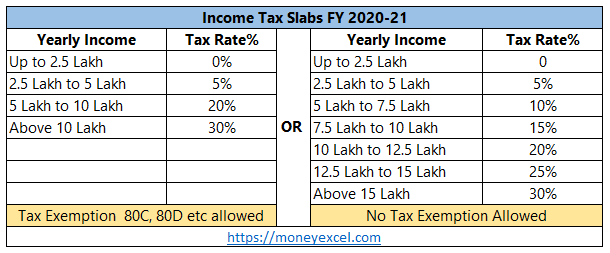Every salaried people are looking for tax saving option. No one like to pay hard earned money to the government. However, very few people do tax planning in the effective way. There are many tax saving options that helps you to save money.
In this post, we will take a look at How to Save Income Tax in FY 2021-22.
There are two income tax slabs applicable as of now. The old tax slab allows tax payers to save money by investing in the tax saving instruments. The new tax slab is very simple. Tax payer need not to make any investment and they can enjoy lower tax slab rate. The new tax slab is more suitable for upper middle group who do not invest money for saving tax. The details about applicable tax slab in FY 2021-22 are given below.
Income Tax Slabs FY 2021-22

How to Save Income Tax in India?
(1) Section 80C – Up to 1.5 Lakh tax saving under section 80C
You need to fully utilize your section 80 C limit. You can get tax exemption up to 1.5 lakh by investing in various tax saving instrument under section 80C. The details of tax saving instrument where you can save money are given below.
- ELSS – ELSS is special type of mutual fund popular as equity linked saving scheme. You can invest in ELSS via lump sum or SIP route. ELSS funds comes with lock in period of 3 years. The long term capital gains applicable on the ELSS @ 10%.
- Tax Saving Fixed Deposit – Tax saving fixed deposit is one of the best tax saving instrument. Tax saving fixed deposit is for risk-averse investors. Tax saving FD comes with lock in period of 5 years.
- Public Provident Fund (PPF) – Public provident fund is most secure investment option. PPF is long term investment option. The main benefit of PPF is it falls under EEE category. You can claim up to 1.5 Lakh per year by investing in PPF.
- Life Insurance Premium – Life insurance premium payment for self and family members are allowed for deduction under section 80C. This is applicable for all type of insurance policy such as term plan, ULIP, endowment policy etc.
- Home Loan – You can get benefit of home loan principal repayment under section 80C. The maximum amount allowed for the principal is 1.5 Lakh per annum.
- Tuition Fees – Tuition fee paid at school for child education can be claimed for tax deduction by parents under section 80C.
- Sukanya Samriddhi Scheme – You can make investment in Sukanya Samriddhi scheme and claim tax benefit for the amount contributed toward SSY.
- Senior Citizen Saving Scheme – Senior citizen saving scheme fixed deposit is special scheme for the senior citizen. The senior citizen can get higher interest rate on SCSC. One can claim tax deduction by investing in SCSS.
- EPF – Any contribution made in the employee provident fund can be claimed for the tax deduction under section 80C.
(2) National Pension System (NPS) section 80CCD
You can claim additional tax benefit of Rs.50000 under section 80CCD for making investment in NPS. You need to open NPS account for the same. The contribution to be done up to age 60 in NPS account.
(3) Health Insurance Premium section 80D
Health insurance premium paid towards self and family members up to Rs.25000 is allowed for the tax deduction. For senior citizen the maximum limit is Rs.50000. For self and senior citizen parents the maximum limit put together is Rs.75000.
(4) Repayment of Interest on a Home Loan
You can also enjoy tax benefit for the repayment of interest on a home loan. The maximum eligibility amount for the tax deduction for home loan repayment is 2 Lakh. This amount is additional amount on the top of 1.5 Lakh amount eligible for section 80C.
(5) Interest earned in saving account
The interest income up to Rs.10000 on the saving accounts per financial year is exempted for the tax deduction. This is as per section 80TTA. The limit is higher for the senior citizen it is Rs.50000 under section 80TTB.
(6) Donation under section 80G
Section 80G allows you to claim tax benefit for the donation made. The donation can be made in any organization including political and religious organization that give receipt under section 80G.
(7) Repayment of Education Loan section 80E
The interest component paid for the education loan is allowed for the tax deduction. There is no upper limit on the interest repayment of education loan.
I hope you have got complete information about How to Save Income Tax in India. Do share your favorite tax saving options in the comment section given below.
Leave a Reply